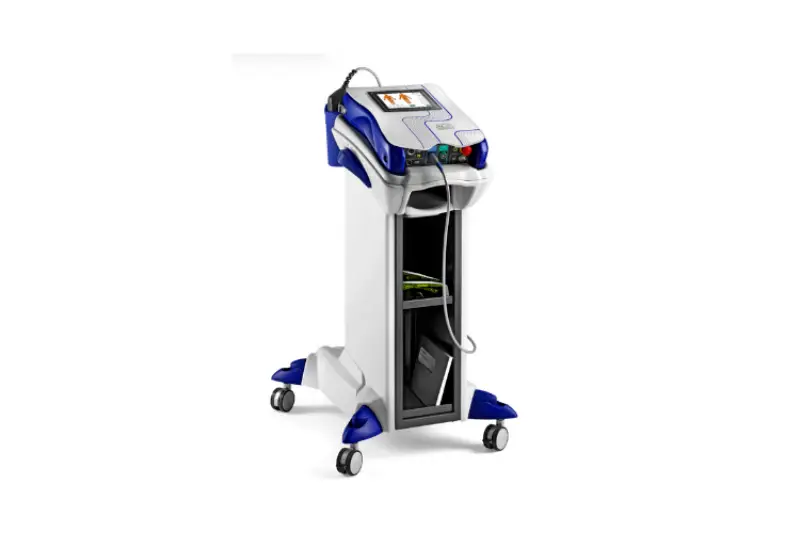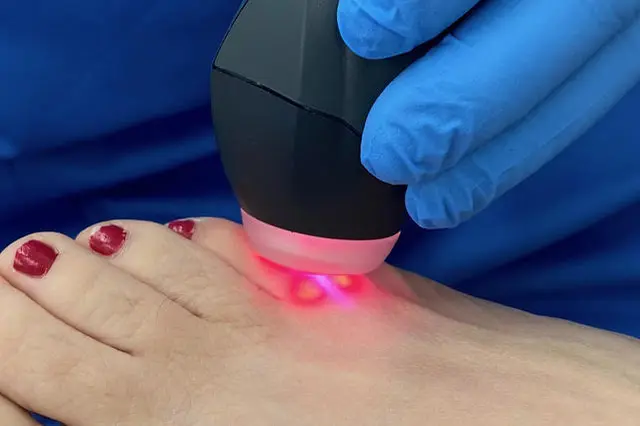Walsh Podiatry in Birmingham is now offering laser therapy for rapid relief of foot conditions. Laser therapy is a form of medical treatment that uses low-intensity laser light in order to reduce the pain of arthritis, neuropathy, bursitis, musculoskeletal pain and much more by stimulating the natural healing properties of your body; At Walsh Podiatry we use the latest in Class IV Therapeutic Lasers. The levels of light do not provide high levels of heat to your body; this is why it is also known as cold laser therapy or low level laser therapy. This is especially true when compared to other forms of laser treatment, such as those used to destroy tumours. While other forms of laser treatment, such as surgical and aesthetic, heat the body’s tissue, true to its name, cold laser therapy does not.
During a low power laser therapy session, varying wavelengths and outputs of light are applied directly to the area, and the body’s tissue will absorb the light. The use of light causes a reaction causing the damaged cells to respond with a physiological response that will essentially kickstart the body’s natural regeneration.
The procedure is entirely painless and 100% non invasive and laser safety is of the utmost importance to us. There is no sound and no vibration or heat. Often benefits can be found after just one treatment, however often we recommend a course of treatment.

Laser therapy involves directing Laser light energy into inflamed or damaged tissues to accelerate the body’s natural healing process.
The laser is placed in direct contact with the skin which enables light photons to penetrate the tissue and interact with molecules within
the cells to cause several biomechanical effects.
After a full clinical assessment of your condition, we will tailor-make a treatment protocol just for you.
The number of sessions you will require will depend on the condition – this will be discussed in your initial appointment.
Treatments are quick and painless and often you will feel the results during the first treatment. For chronic conditions, it may take a few sessions for you to feel the effects, but the cellular benefits will be immediate!
If you haven’t seen us about the problem before we will need to assess you first in a biomechanical assessment and then move on to the laser.

A laser therapy session’s time varies depending on what condition is being treated and the size of the area being treated.
Typically, a session’s duration can last anywhere between 10-30 minutes. The total number of sessions is determined by the individual’s severity of the injury.
The effects of laser therapy are generally minimal, however, some may experience bruising, redness, mild swelling or slight pain following the treatment. These symptoms usually subside a couple of hours after the treatment.
There is a possibility of the treatment causing skin irritation or allergic reactions, however, this is only in rare cases and the practitioner should discuss this before proceeding.
Yes, laser therapy is suitable for most individuals. However, there are some circumstances that are not suitable for laser therapy treatment, such as if you are pregnant, have active cancer and take certain medications.
It is important to speak with the healthcare professional before proceeding to determine whether laser therapy is the best course of treatment.
The effects of laser therapy vary depending on the type of condition, the individual’s response to the treatment, and if there is an underlying cause of the problem.
It is recommended that you discuss with your healthcare provider the expected duration of the effects of laser therapy treatment.
This depends on your insurance provider, policy terms and the specific condition which is being treated.
It may be best to check with your insurance if the treatment is covered before proceeding.
Call us today for expert podiatry care.
Email us for personalised podiatry support
329 Chester Road, Castle Bromwich Birmingham B36 0JG